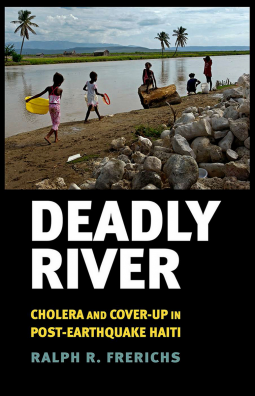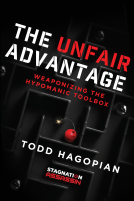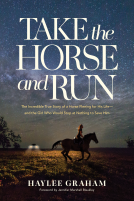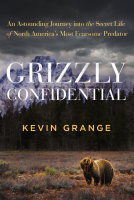
Deadly River
Cholera and Cover-Up in Post-Earthquake Haiti
by Ralph R. Frerichs
This title was previously available on NetGalley and is now archived.
Send NetGalley books directly to your Kindle or Kindle app
1
To read on a Kindle or Kindle app, please add kindle@netgalley.com as an approved email address to receive files in your Amazon account. Click here for step-by-step instructions.
2
Also find your Kindle email address within your Amazon account, and enter it here.
Pub Date May 01 2016 | Archive Date May 03 2016
Cornell University Press | ILR Press
Description
In October 2010, nine months after the massive earthquake that devastated Haiti, a second disaster began to unfold—soon to become the world's largest cholera epidemic in modern times. In a country that had never before reported cholera, the epidemic mysteriously and simultaneously appeared in river communities of central Haiti, eventually triggering nearly 800,000 cases and 9,000 deaths. What had caused the first cases of cholera in Haiti in recorded history? Who or what was the deadly agent of origin? Why did it explode in the agricultural-rich delta of the Artibonite River? When answers were few, rumors spread, causing social and political consequences of their own. Wanting insight, the Haitian government and French embassy requested epidemiological assistance from France. A few weeks into the epidemic, physician and infectious disease specialist Renaud Piarroux arrived in Haiti.In Deadly River, Ralph R. Frerichs tells the story of the epidemic—of a French disease detective determined to trace its origins so that he could help contain the spread and possibly eliminate the disease—and the political intrigue that has made that effort so difficult. The story involves political maneuvering by powerful organizations such as the United Nations and its peacekeeping troops in Haiti, as well as by the World Health Organization and the U.S. Centers for Disease Control. Frerichs explores a quest for scientific truth and dissects a scientific disagreement involving world-renowned cholera experts who find themselves embroiled in intellectual and political turmoil in a poverty-stricken country.Frerichs's narrative highlights how the world’s wealthy nations, nongovernmental agencies, and international institutions respond when their interests clash with the needs of the world’s most vulnerable people. The story poses big social questions and offers insights not only on how to eliminate cholera in Haiti but also how nations, NGOs, and international organizations such as the UN and CDC deal with catastrophic infectious disease epidemics.
Advance Praise
"Deadly River tells the story of how the lethal disease cholera found its way from the high valleys of the Himalayas to the tropical landscapes of Haiti, months after the devastating 2010 Port-au-Prince earthquake. This knowledge didn't come easy but was acquired through the dogged efforts of many investigators (a dedicated French epidemiologist, international infectious disease experts, molecular biologists, and journalists) all of whom were focused on finding the truth rather than accepting speculation or unproven theories. Ralph R. Frerichs's book is a fascinating read that also provides many insights into the strengths and weaknesses of human nature—curiosity, skepticism, stubbornness, ignorance, pride, denial, deception—all framed by a tragic event that has changed the lives of millions of impoverished people."—John J. Mekalanos, Harvard Medical School
Available Editions
| EDITION | Other Format |
| ISBN | 9781501702303 |
| PRICE | $29.95 (USD) |
Average rating from 6 members
Featured Reviews
 Kim C, Educator
Kim C, Educator
In Deadly River, we learn in-depth about the cholera outbreak that cost so many lives in Haiti a mere nine months after the devastating earthquake. The story follows French epidemiologist Renaud Piarroux as he travels the country searching for clues to the origin of the outbreak. Along the way, he comes to realize that he might be in danger due to those who wish to hide the true source from the eyes of the world. Politicians, CDC, UN, and others try to cover up the facts and protect their own interests. The tale becomes a detective story, where Piarroux uses science to search for the truth. As the crisis builds due to the rapid spread of the disease, will the truth be lost in the chaos?
This was a fascinating look at the science behind epidemiology. The tools used to search out a point of origin are interesting and allow the reader to see into the complex world of micro-biologic science. The text was written in a way that anyone can understand. You won’t need a degree in biology to follow along! I recommend it not only as a historical document, but as a true mystery story as well. It will interest readers and make then ache for the people of Haiti who went through so much in such a short time.
Readers who liked this book also liked:
Todd Hagopian
Business, Leadership, Finance, Nonfiction (Adult), Professional & Technical
JUNO
Arts & Photography, Comics, Graphic Novels, Manga, Travel

















